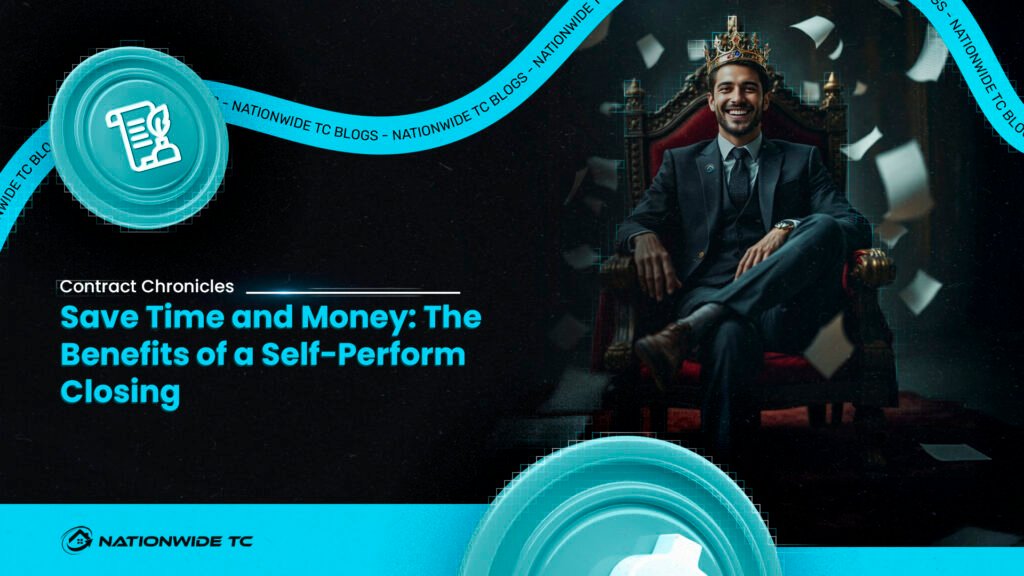Firstly, real estate transactions require careful coordination and accurate documentation. Secondly, many buyers, sellers, and investors look for ways to simplify the process. Additionally, one method that has gained popularity is using a Self-Perform Closing. Moreover, this approach allows parties to take more control over the transaction steps. However, a smooth Self-Perform Closing requires knowledge and guidance. Therefore, a transaction coordinator becomes essential for support. Ultimately, the goal is to close faster and save money while staying compliant.
Understanding a Self-Perform Closing
Firstly, a Self-Perform Closing refers to completing the closing steps without traditional third-party involvement. Secondly, investors or agents handle key tasks directly, including signing coordination and document collection. Additionally, this approach provides more visibility and flexibility during the closing timeline. Moreover, it allows parties to avoid certain fees charged by external closing agents. However, accuracy and legal compliance remain crucial. Therefore, a transaction coordinator helps ensure each stage proceeds correctly. Ultimately, a Self-Perform Closing empowers the involved parties while still reducing errors.
Why Many Investors Choose Self-Perform Closing
Firstly, investors often pursue strategies that reduce operational costs. Secondly, a Self-Perform Closing helps maintain efficiency in every deal. Additionally, investors value speed when moving multiple properties at once. Moreover, traditional closings can sometimes delay business growth. However, choosing a Self-Perform Closing does not mean sacrificing stability. Therefore, working with a transaction coordinator ensures professional oversight. Ultimately, investors choose this method to balance speed, savings, and compliance.
The Role of the Transaction Coordinator
Firstly, a transaction coordinator acts as the organizational backbone of the closing process. Secondly, they manage deadlines, signatures, and communication. Additionally, they make sure every required document is complete and accurate. Moreover, they help prevent delays and legal issues. However, they do not replace attorneys or brokers. Therefore, they work alongside licensed professionals to support the closing well. Ultimately, their guidance makes a Self-Perform Closing smooth and stress-free.
Time Savings with a Self-Perform Closing
Firstly, time efficiency matters in real estate, especially in competitive markets. Secondly, a Self-Perform Closing reduces waiting periods caused by third-party processing. Additionally, parties can schedule signing and document exchange faster. Moreover, decisions can be made immediately when parties communicate directly. However, coordination requires consistent management. Therefore, a transaction coordinator ensures no task gets overlooked. Ultimately, the speed gained from a Self-Perform Closing boosts deal momentum and confidence.
Cost Efficiency Benefits
Firstly, closing fees add up quickly when using traditional settlement agencies. Secondly, a Self-Perform Closing allows investors and agents to bypass several administrative charges. Additionally, the reduction in overhead improves profit margins. Moreover, cost savings become substantial when managing multiple properties. However, cost savings should never compromise legal compliance. Therefore, the guidance of a transaction coordinator remains essential. Ultimately, smarter spending supports both sustainability and growth in real estate.
Reducing Stress and Improving Control with Self-Perform Closing
Firstly, many closings become stressful due to communication delays. Secondly, direct involvement in a Self-Perform Closing improves clarity. Additionally, parties understand exactly where the process stands at all times. Moreover, misunderstandings and surprises become less frequent. However, more control also means more responsibility. Therefore, a transaction coordinator organizes the workflow to avoid confusion. Ultimately, stress decreases when communication is structured and predictable.
How a Transaction Coordinator Protects Your Interests
Firstly, every real estate transaction contains legal and financial obligations. Secondly, a Self-Perform Closing must follow state-specific requirements. Additionally, errors can cause deal failure or liability issues. Moreover, missing signatures or incorrect dates may invalidate agreements. However, a trained transaction coordinator reviews each detail carefully. Therefore, they help protect both short-term and long-term interests. Ultimately, their expertise acts as a safety net throughout the closing.
Technology and Tools Used in a Self-Perform Closing
Firstly, digital tools support faster and more accessible closings. Secondly, e-signing platforms allow remote document completion. Additionally, document tracking systems keep every form in one place. Moreover, secure storage prevents record loss. However, technology must be used correctly. Therefore, a transaction coordinator selects reliable platforms and ensures proper process alignment. Ultimately, technology strengthens efficiency when combined with human oversight.
Step-by-Step Overview of a Self-Perform Closing
Firstly, the process begins with confirming contract terms. Secondly, all required disclosures and addendums are collected. Additionally, property details are verified for accuracy. Moreover, payoff statements or settlement adjustments are reviewed. However, every step must follow state closing regulations. Therefore, a transaction coordinator monitors compliance. Ultimately, signing and funding complete the process when documents align correctly.
The Financial Impact of a Self-Perform Closing
Firstly, financial benefits become more noticeable across multiple transactions. Secondly, each Self-Perform Closing saves administrative and service fees. Additionally, even small savings accumulate significantly over time. Moreover, investors reinvest these funds to scale operations. However, cutting costs must not reduce closing quality. Therefore, professional oversight remains necessary to maintain precision. Ultimately, cost management strengthens long-term financial performance.
Self-Perform Closing and Professional Collaboration
Firstly, choosing a Self-Perform Closing does not mean working alone. Secondly, legal, financial, and real estate professionals still play important roles. Additionally, the transaction coordinator helps bridge communication between parties. Moreover, their role ensures all professionals remain informed. However, collaboration requires organization and structure. Therefore, the transaction coordinator maintains clear communication channels. Ultimately, teamwork produces a confident and efficient closing experience.
When a Self-Perform Closing Works Best
Firstly, a Self-Perform Closing benefits investors handling frequent or high-volume transactions. Secondly, it supports agents working with experienced buyers or sellers. Additionally, it suits parties seeking faster timelines. Moreover, motivated buyers and sellers prefer direct involvement. However, complex legal situations may require attorney-led closings. Therefore, evaluating the scenario ensures a safe decision. Ultimately, choosing the right method prevents complications.
How to Execute a Smooth Self-Perform Closing
Firstly, preparation is the foundation of success. Secondly, gather all required forms early. Additionally, confirm timelines and communication expectations. Moreover, maintain organized document storage. However, small errors can disrupt everything. Therefore, rely on a transaction coordinator for oversight. Ultimately, planning ensures a calm, predictable, and professional closing outcome.
Conclusion
Firstly, a Self-Perform Closing offers real benefits for time, cost, and control. Secondly, this approach lets parties stay directly involved in important steps. Additionally, it supports faster closings with fewer fees. Moreover, flexibility increases when third-party delays are reduced. However, success depends on organization and compliance. Therefore, the transaction coordinator plays a vital role in guiding the process. Ultimately, a Self-Perform Closing works best when supported by expert oversight, clear communication, and strong preparation.
https://nationwidetc.com/self-performing-close
https://calendly.com/nationwidetc/discovery



